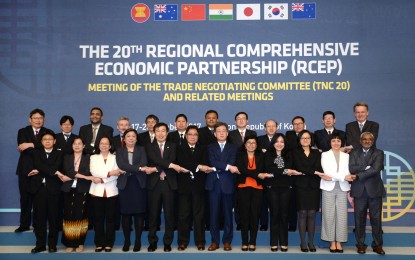
(Photo grabbed from RCEP website)
MANILA – Concerns of various agriculture groups on the Regional Comprehensive Economic Partnership (RCEP) were answered on Tuesday by representatives coming from different government agencies during a public hearing of the Senate subcommittee on RCEP presided by Senate Pro Tempore Loren Legarda.
RCEP, which was recently endorsed by President Ferdinand R. Marcos Jr., is expected to be ratified by the Senate within the first quarter of this year.
During the hearing attended by Senate President Juan Miguel Zubiri, agricultural groups asked for assurance from the government that farmers should be protected and implementation of programs to improve productivity and enhance competitiveness of agricultural products.
Based on RCEP, 15 agricultural commodities representing 33 tariff lines will see lower tariff rates which account for 1.9 percent of total tariff lines and only USD132 million or 0.8 percent of total agricultural imports.
These commodities will be affected since RCEP preferential rates for these items will be generally lower than the most favored nation rate and lower than the ASEAN+1 rate after approximately 15 years.
Department of Trade and Industry (DTI) Secretary Alfredo Pascual noted the RCEP aims to maintain the ASEAN's centrality within the broader region not just a simple trade agreement that provides enhanced market access and a stable regulatory framework.
"It is a strategic tool in ensuring the region's continuous economic advantage and will help maintain a balance of power within the region. Considering the rise of protectionism and ongoing geo-political crisis, the signing and entry to force of RCEP reflects the ASEAN region's unwavering commitment to a rules-based trading system that maintains an open, stable, free, and fair trading environment," Pascual told the subcommittee.
RCEP, he said, is expected to further promote economic efficiency of member-states, strengthen linkages and sectors such as manufacturing, technology, agriculture and natural resources as well as reinforcing small and medium enterprises' participation in the global value chain networks.
"Through improved market access to goods and services as well as stable and predictable RCEP, provides a platform to encourage more investments in the country. These investments are what we need to grow our economy," Pascual explained.
The DTI chief clarified, however, that RCEP will not immediately solve the problems of various sectors.
"It only provides an enabling environment. Government and business will still need to do their part in making our industries more productive and competitive," Pascual emphasized.
Also endorsing the ratification of the trade agreement, Department of Energy (DOE) Undersecretary Wimpy Fuentebella noted that RCEP is expected to bring in more investments and technology for the energy sector.
"We are utilizing this agreement to pursue the Philippine Energy Plan that works towards energy security," Fuentebella said.
Among the member-countries which includes the ASEAN, China, Japan, South Korea, Australia, and New Zealand, only the Philippines has not ratified the RCEP.
Zubiri admitted in the public hearing that in the 18th Congress, senators were hesitant on ratifying the RCEP because of their support to the agriculture sector.
However, he noted that agriculture is not the only industry in the country and other industries such as semiconductors, exports, MSMEs (micro-, small and medium-sized enterprises), among others, should also be considered.
"We have to look at the totality of this measure, the totality of all the people it can help in the future," Zubiri said.
"This is an opportunity now. MSMEs like Potato Corner and all of them who want to do business in Indonesia, Malaysia, and Cambodia will have a free opportunity now to do their trade with these ASEAN countries," he added.
Legarda, for her part, stressed the necessity to carefully study RCEP and consider the positions of various stakeholders.
"Beyond exports and imports and the economic and societal benefits it offers, how does RCEP affect every Juan and Juana? How does this help improve our internal and domestic policies? How will our domestic policy align with the global agreement? What is an acceptable RCEP?" Legarda asked.
"Trade agreements have a direct effect on people's lives that trade agreements must be subject to public scrutiny. The scrutiny, must, of course, be based on facts," she added.
The World Bank reported that RCEP economies, affecting 2.2 billion people in the region, account for 29 percent of the global gross domestic product which amounted to USD96.51 trillion in 2021.
According to DTI, RCEP member economies account for 50.4 percent of the Philippines’ export market, 67.3 percent of the country’s imports, and 58 percent of the country’s foreign direct investment inflows, offering to decrease the country’s poverty incidence by 4.97 percent. (PNA)
